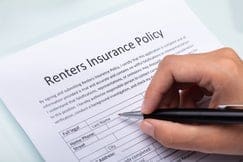
Renters Insurance for First-Time Renters
Are you planning to rent a home for the first time in your life? Maybe you are young and just starting out. Maybe you have previously owned a home, but would rather not deal with the responsibility (and cost) of maintenance and upkeep. In any case, renting for the first time is going to be a big step, and it might even feel a bit overwhelming at times.
When you rent a home, you agree to take on certain responsibilities and obligations as the tenant. As a result, you’ll probably face several personal and legal requirements, one of which is usually the requirement to buy renters insurance. What are the important things to consider when getting your first policy?
What is Renters Insurance?
As a renter, you do not own the home you live in. The house, apartment, condo or other dwelling is someone else’s possession, and you must pay your rent regularly in order to continue to lease it.
Still, though you down own the rental home, you have a responsibility to take care of it. Your lease will outline the obligations that you are required to meet if you want to remain eligible to continue to live there. One of these obligations is usually the requirement for the tenant to carry renters insurance.
With renters insurance, you’ll be able to carry a financial guarantee that you can protect the property and yourself in case of damaging accidents. In one way, it helps reassure property owners that you have the financial backing to take care of yourself inside their property.
Still, renter’s insurance isn’t just there to just free your landlord from the liability of renting to you. It is also there to give you financial help in case of any number of household accidents. If you face a costly accident while you live in the property, then your policy can aid you in paying your recover costs. With the help of your renters insurance, you’ll be able to emerge from mishaps in a more secure position.
Why do I need it?
The bottom line is renters insurance should never be considered optional for any tenant, for a number of reasons:
· Primarily, you will need coverage because many landlords require it. Often, landlords can refuse to rent to tenants who cannot prove that they have an active policy. You will have to keep coverage active (with appropriate limits) as long as you live in the home.
· Coverage can provide you with vital legal assistance. You never know if an accident in your home, that is your fault, might result in a lawsuit against you brought by another party (a neighbor, friend, landlord etc.). Your coverage might help you pay your legal expenses. Policies won’t cover all types of lawsuits, but they might prove instrumental in cases involving accidental harm you cause to others or their property.
· Your coverage might assist you with everyday costs in case you face losses to your personal assets. It might help you pay to rebuild your life and address the extra costs of living that might result from unexpected accidents.
What Will it Cover?
Generally, renters insurance will provide three types of coverage:
· Liability Insurance
Liability insurance covers you in case you are at fault for harm (injuries, property damage etc.) that you do to someone who doesn’t live with you. Even if this damage was unintentional, it might still be your responsibility to pay for. Liability coverage enables you to do so.
This is the coverage that most landlords require. Since the home itself belongs to someone else, this coverage might help pay if you cause a fire or other accident that damages it. Beyond that, it can also cover any harm done to others, such as someone who is visiting your home.
· Possessions Coverage
You might not own a rental home itself. However, you will own a lot of the contents inside. Should they get damaged, your policy can help you pay to replace them. Coverage might apply to your clothing, electronics, furniture and more.
To get the right coverage, you will usually need to appraise and document the value of particular items. Still, sometimes you won’t be able to receive the full replacement cost of damaged belongings. Policies might only pay for items’ depreciated cash values. To gain more protection for items of value, you might be able to schedule these items as specifically-insured items on your policy,
· Living Expenses
Damaging accidents could make your rental property unsafe to occupy. It might take time for repairs to occur, and you might even have to look for a new place in the meantime. Living expenses coverage can apply to the costs that might arise during these circumstances. For example, should the apartment burn, your coverage might pay for the costs of hotel bills, dining or related expenses.
Your renters insurance agent will help you determine the right policy limits and structure for your particular needs. Should you need specialized protection, your coverage can usually address it. With the right attention to details, you’ll have appropriate protection in your first place.
Tags: Renters Insurance
